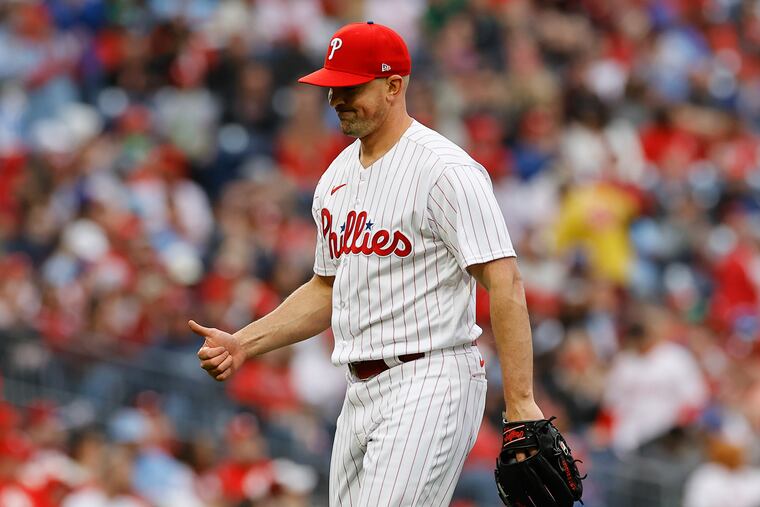Slow-moving pitcher Andrew Bellatti has come to appreciate MLB’s new pitch clock
The Phillies hurler was one of the slowest-working pitchers in baseball last year. Now, he views the pitch clock as an asset.

Andrew Bellatti was not just the Phillies’ slowest-working pitcher last season; he was also one of the slowest-working pitchers in baseball.
According to Baseball Savant, on average, the Phillies reliever took 18.6 seconds between pitches in 2022 with no runners on base. That ranked sixth among all qualified MLB pitchers.
When he heard there would be a pitch clock this season, he didn’t quibble over it. He got to work. Bellatti said he almost spent more time this spring doing pitch-clock drills than anything else. Phillies pitchers worked on managing the clock, adjusting their routines, and delaying getting the ball back from the catcher.
The coaching staff used pitch clocks in live batting practice so that everyone could get used to it. One day, Bellatti got three violations. In retrospect, he said it was a good thing. It was a wake-up call. He was going to have to trim more time between pitches.
And since then, he has.
Baseball Savant says he is now averaging 13 seconds, a 5.6 drop from his 2022 average. There are plenty of pitchers who have voiced concerns about the pitch clock. Aaron Nola and Zack Wheeler have said it makes them feel rushed, and to be fair, the clock probably has a bigger impact on starting pitchers than it does on relievers. But it does feel notable that one of the slowest pitchers in the sport doesn’t just tolerate it — he sees it as an asset.
» READ MORE: Phillies need to find a way to make do until Bryce Harper and the cavalry arrive
One reason Bellatti took so much time between pitches was that he would walk around the mound. It would help him collect his thoughts before his next pitch. But he’s since realized that having unlimited time to think may have been a detriment.
“If you start overthinking it, everything can get out of whack,” he said. “I know for me, if I start getting too anxious, I start losing arm side up fastballs and stuff like that. It was more about calming myself down to make the right pitch. Now I’m just keeping it simple and just attacking.
“I actually think it has been helpful. I think I’ve made a big improvement in making competitive pitches. Even in the home opener [against Cincinnati], I got to a couple of 3-2 counts, but I looked at the video and all of the pitches were very competitive. I think it’s allowed me to get into a good rhythm.”
It’s still early, but Bellatti’s spring-training and regular-season stats reflect that. The pitch clock has allowed him — has encouraged him — to have a short memory. He walked six batters this spring, but would often bounce back with a strikeout to follow. This regular season, he has walked just two batters through 4⅓ innings pitched, with five strikeouts. He has yet to allow an earned run.
“It doesn’t allow me to think about the last pitch I threw for a ball,” Bellatti said. “It’s always moving on to the next pitch. So I think that’s helped me. Keep moving, don’t stall, don’t think about the previous pitch.”
In some ways, Bellatti thinks that the pitch clock pairs perfectly with the Phillies’ pitching philosophy — PHAH, which stands for “[expletive] all hitters.” The unlimited time he had between pitches last year was also time for a hitter to collect himself. Bellatti believes that the quicker pace will put more pressure on opposing hitters in the box.
» READ MORE: The Phillies’ new pitching mantra isn’t family-friendly, but it’s working
“It’s interesting,” he said. “You take our mantra, PHAH, and you put it with a quicker pace, and less time to think and I think it actually, in the long run, our staff is really going to take full advantage of it. It’s less time to think. You just grab the ball and attack.”
Extra bases
Outfielder Jhailyn Ortiz cleared waivers and was outrighted to triple-A Lehigh Valley on Saturday. Ortiz was designated for assignment on April 4.